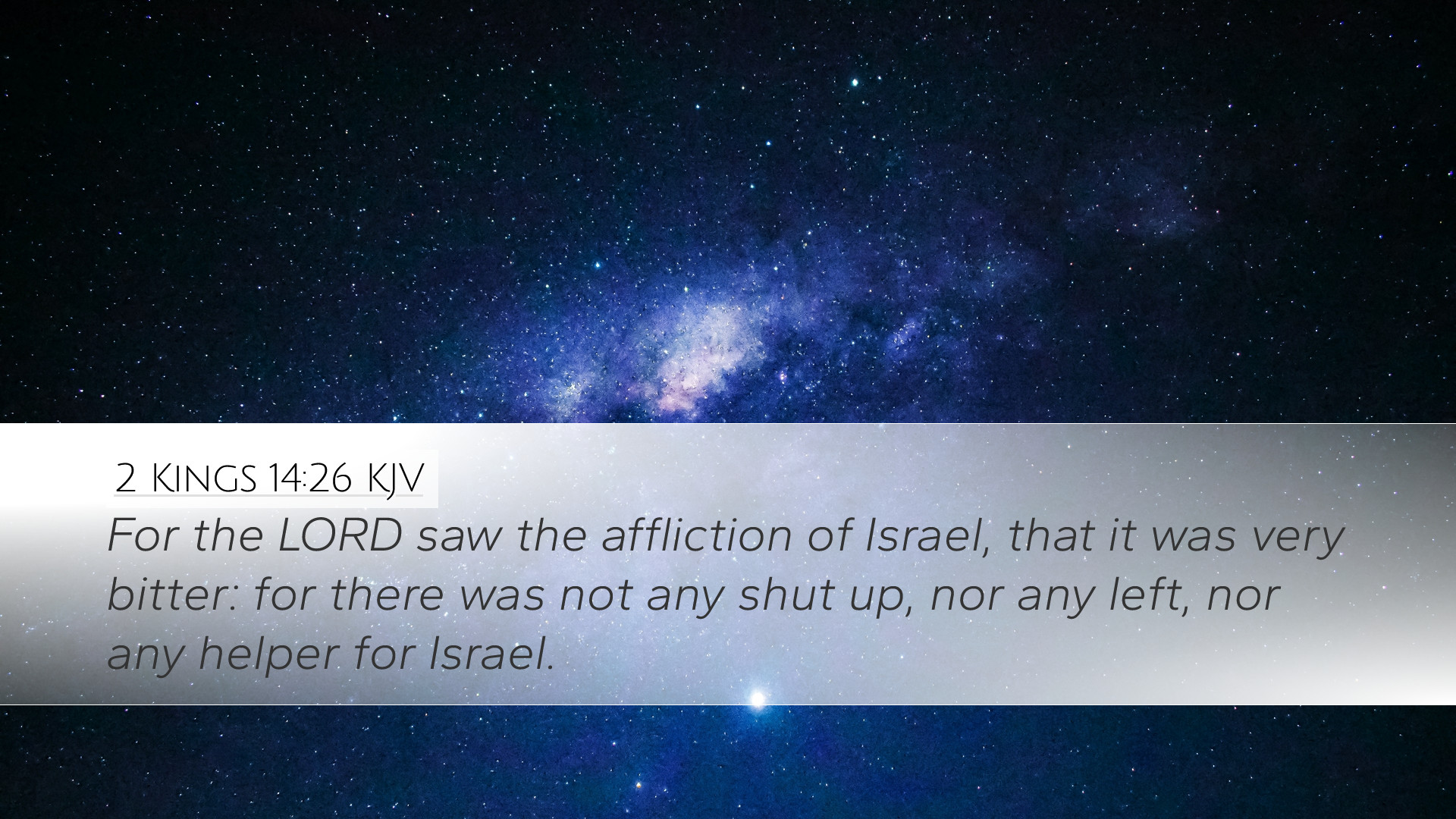Commentary on 2 Kings 14:26
2 Kings 14:26 states: "For the LORD saw that the affliction of Israel was very bitter, and that there was no shut up, nor any left, nor any helper for Israel."
This verse provides a profound insight into God’s awareness and compassion towards His people during a time of great suffering and desperation. The context is critical in understanding the implications of this declaration.
Contextual Overview
The historical backdrop of this scripture occurs during the reign of Jeroboam II, a king of Israel who, despite his shortcomings and the general state of moral decline, was used by God to restore the boundaries of Israel and to bring some measure of prosperity. Despite the temporary revival, the nation was still steeped in idolatry and wickedness, leading to deep-seated issues which resulted in their affliction.
Divine Observance of Affliction
The phrase "For the LORD saw..." suggests a powerful theological principle: God’s omniscience and His active engagement in human affairs. This highlights two core attributes of God - His omnipotence and His deep compassion.
- God’s Omniscience: Both Matthew Henry and Albert Barnes emphasize that God is aware of all human suffering. This divine observation is not passive but involves an active concern for His people.
- God’s Compassion: Adam Clarke notes that God’s mercy is emphasized through His attention to Israel’s plight; He recognizes that their sufferings are not just physical, but deeply spiritual and emotional.
The Bitterness of Affliction
The term "very bitter" serves to underline the depths of Israel's despair. The affliction was not just state-sponsored oppression but a consequence of their estrangement from God.
- Spiritual Consequences: Henry warns that the bitterness reflects a nation in rebellion against God, suffering the consequences of their former choices.
- Social Implications: Both Barnes and Clarke highlight the social ravages of sin, suggesting that no nation can thrive in rebellion against God.
The Absence of Help
The verse notes, "there was no shut up, nor any left, nor any helper for Israel." This phrase provides a stark realization of Israel's total abandonment and vulnerability.
- Isolation in Suffering: Adam Clarke observes that the absence of a leader or helper reflects a time when Israel was forsaken, leaving them to face their adversities alone.
- Divine Help: Despite the bleak scenario, there is an implicit assertion that while human help was absent, God's help was not completely withdrawn, as the narrative progresses to reveal God's plans for restoration.
Theological Significance
The verse encapsulates vital theological truths concerning God's relation to His people amidst suffering.
- God's Sovereignty: This passage indicates that even in calamity, God remains sovereign and aware of His people's conditions.
- Hope in Despair: Both Henry and Barnes present a glimmer of hope; God does not abandon His people to suffering, and His plan for redemption persists even when immediate help seems absent.
- Encouragement for Believers: For contemporary believers, this verse reminds that in times of despair, God sees, cares, and eventually intervenes according to His timing and purpose.
Concluding Reflections
In summary, 2 Kings 14:26 serves as a poignant reminder of God’s awareness and compassion towards His afflicted people. It highlights the nature and extent of their suffering while providing assurance of God’s continuous presence even when help seems to have vanished. The teachings derived from this scripture encourage pastors, students, theologians, and scholars alike to recognize the deeper implications of divine oversight in the face of adversity.
As we navigate our own challenges, let us remember that God remains mindful of our struggles and is steadfast in His love and commitment to deliver us in due time.


